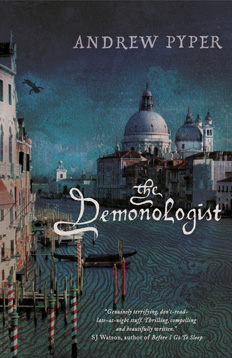What happens when the devil believes in you?
 CREDIT: ORION PUBLISHING CO (2013)
CREDIT: ORION PUBLISHING CO (2013)With his life falling apart and a demon at his back, The Demonologist turns to the only book that has answers.
Professor David Ullman has had a rough year. His wife is sleeping with a man he hates. His daughter is slowly becoming more and more depressed. His best friend is slowly dying of cancer. His own demons are drawing closer and closer.
Just as things appear to be at their worst, a mysterious woman shows up to offer him a strange form of help in the form of a ton of money and a free trip to Venice. All Ullman has to do is witness a phenomenon. What could possibly go wrong?
Delving into the world of John Milton’s Paradise Lost, The Demonologist explores a world where demons are real, with the ability to change lives forever. After his daughter goes missing, Ullman uses all of his insights into the world of demons to follow a breadcrumb trail that leads to madness.
The novel often feels similar to the Keanu Reeves’ version of Constantine, complete with suicidethat- might-not-be-suicide, a cynical and depressed main character with a silly amount of knowledge, and a female companion dragged into events to provide a somewhat stabilizing influence.
This isn’t to say that the two are exactly alike. The Demonologist is far more sympathetic to Satan’s side, and spends a lot of time quoting Milton’s epic poem. It also has far more ridiculous riddles that are explained in ways that make little sense. It occasionally feels like the author flipped through the pages of Paradise Lost and chose random passages to give significance to.
A big problem with the story is Ullman, a professor who spends the majority of his time and energy talking about how demons aren’t real and exists only in the minds of men. With his ‘expertise’ in the field, his willingness to believe the Unnamed that’s speaking to him makes little sense. The book even repeatedly mentions that Satan and his minions lie, yet Ullman blindly follows.
The entity he’s talking to is also not overly clever, as it repeatedly gives itself away for the sake of taunting a man already on the brink. Many of its actions don’t really make sense in light of which Demon it’s supposed to be, and actively putting the life of someone it needs in danger seems like a foolish move.
There’s also a strange thread running through the book where Ullman always assumes that the Roman Catholic Church is out to get him. He assumes on multiple occasions that people after him are working for the Pope somehow, even though there is literally no reason the Church would have any idea who he was or what happened to him. This makes it feel like the author is bringing his own bias into the story, adding an extra threat for the sake of adding an extra threat.
Overall, The Demonologist is an interesting enough story with an unfortunate amount of illogical aspects added in. The focus on being clever overrides Ullman’s personality and trials, which ruins an otherwise brilliantly written character.














